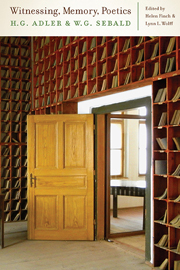Book contents
- Frontmatter
- Contents
- Acknowledgments
- List of Abbreviations
- Introduction: The Adler-Sebald Intertextual Relationship as Paradigm for Intergenerational Literary Testimony
- Part I Intertexts in Context
- Part II Witnessing Trauma and the Poetics of Witnessing
- Part III Memory, Memorialization and the Re-Presentation of History
- Part IV Literary Legacies and Networks
- Afterword
- Bibliography
- Notes on the Contributors
- Index
Introduction: The Adler-Sebald Intertextual Relationship as Paradigm for Intergenerational Literary Testimony
Published online by Cambridge University Press: 05 October 2014
- Frontmatter
- Contents
- Acknowledgments
- List of Abbreviations
- Introduction: The Adler-Sebald Intertextual Relationship as Paradigm for Intergenerational Literary Testimony
- Part I Intertexts in Context
- Part II Witnessing Trauma and the Poetics of Witnessing
- Part III Memory, Memorialization and the Re-Presentation of History
- Part IV Literary Legacies and Networks
- Afterword
- Bibliography
- Notes on the Contributors
- Index
Summary
Deshalb scheint es mir heute unverzeihlich …, daß es darüber nun zu spät geworden ist, Adler, der bis zu seinem Tod im Sommer 1988 in London gelebt hat, aufzusuchen und mit ihm zu reden über diesen extraterritorialen Ort
[It seems unpardonable to me today … that now it is too late for me to seek out Adler, who had lived in London until his death in the summer of 1988, and talk to him about that extra-territorial place]
—W. G. Sebald, AusterlitzH. G. Adler (1910–1988) and W. G. Sebald (1944–2001)
When W. G. Sebald dedicates ten pages of his fictional prose work Austerlitz to H. G. Adler's historical, sociological, and psychological study of the Theresienstadt “ghetto,” Adler's tome is introduced as a source so obscure that it would take only the most meticulous of scholars to be able to seek it out. Sebald's protagonist, the learned architectural historian Jacques Austerlitz, is just such a scholar, but when his research takes him further, he finds that this volume's author is an elusive figure, stating how H. G. Adler was “mir unbekannt … bis dahin” (A 335; a name previously unknown to me, AE 233). While this sentiment may have been shared by many of Sebald's readers, since the publication of Austerlitz in 2001 it seems as if it were no longer too late nor too difficult to seek out H. G. Adler. As Sebald's fame has increased steadily since his untimely death shortly after the publication of Austerlitz, Adler's star is, over one hundred years after his birth, also on the rise.
- Type
- Chapter
- Information
- Witnessing, Memory, PoeticsH. G. Adler and W. G. Sebald, pp. 1 - 22Publisher: Boydell & BrewerPrint publication year: 2014



